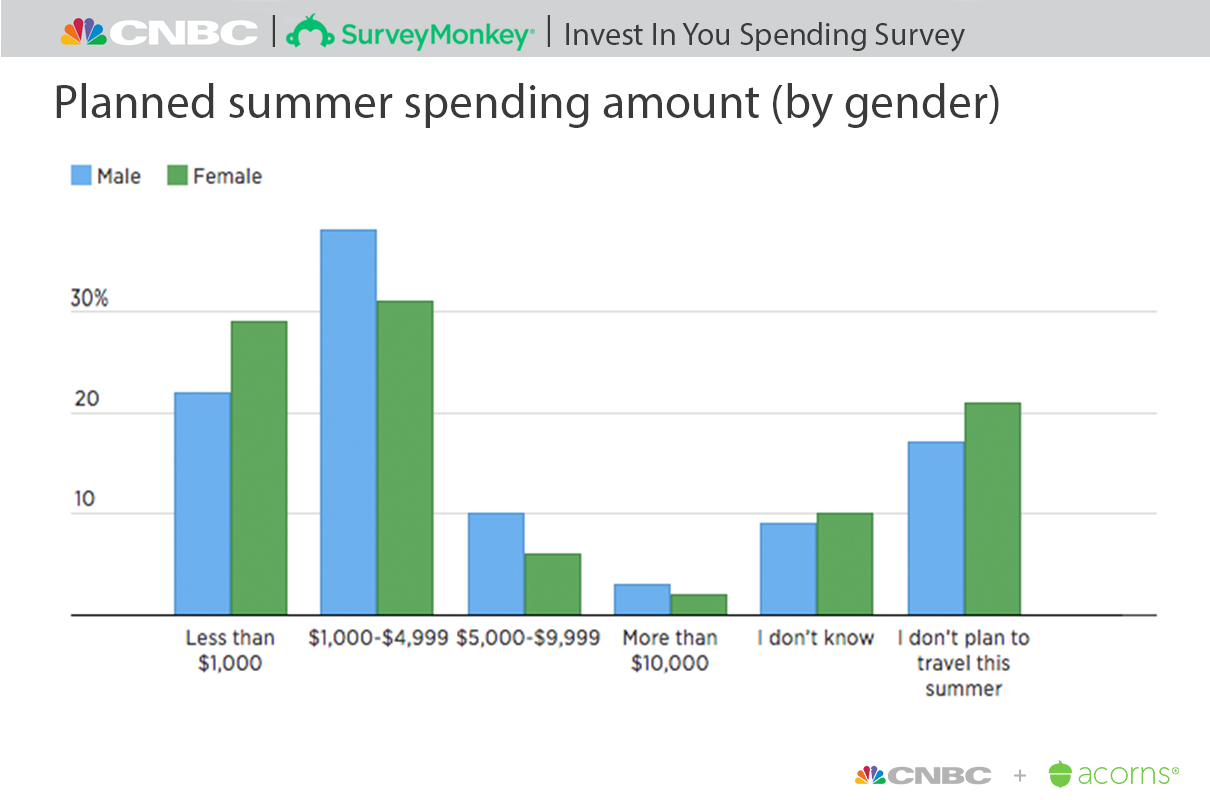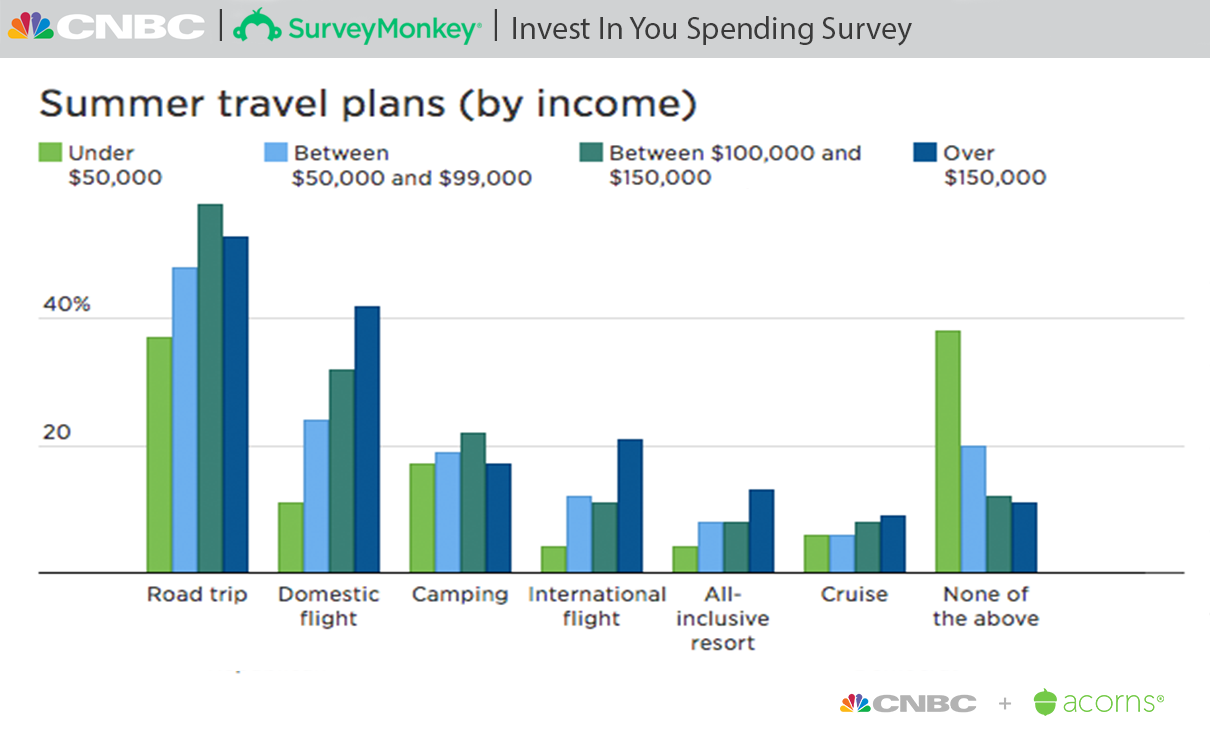More than 41 million people will hit the road July 4th weekend, sparking a big summer trend

Anthony Michael Hall, Chevy Chase, Beverly D'Angelo, and Dana Barron waving from car in a scene from the film 'Vacation', 1983.
Warner Brothers | Getty Images
It is looking like the summer of the road trip in 2019.
Nearly half of adult Americans (45%) plan to pack up the car for vacation travel, according to the Invest in You Spending Survey conducted by CNBC and Acorns in partnership with SurveyMonkey. Only 21% say their summer travel plans include domestic air travel, while only about 1 in 10 Americans (9%) expressed plans to fly internationally during their summer vacation.
Ironically, while bar soap, napkins and diamonds each have fallen victim to millennials' shifting preferences, this demographic — widely rumored to be less car oriented than their elders — is killing for a summer road trip, too. While the greatest percentage of road trippers by age are in the 45- to 54-year-old category (49%), younger Americans are not far behind, with 47% of 35- to 44-year-olds, 46% of 25- to 34-year-olds and 45% of 18- to 24-year-olds planning road trips.
The national survey of 2,800 Americans was conducted June 17–20 by CNBC and Acorns in partnership with SurveyMonkey. A diverse group of men and women were polled across the country, ranging in ages from 18 to over 65, on their money habits and changes in financial behavior.
"Young people may rely on ride-hailing apps to get them around on weekends or to work during the week, but they're just as likely as older adults to say they're taking a summer road trip," said Laura Wronski, senior research scientist at SurveyMonkey. "Road trips are nearly always cheaper than other forms of travel, which helps explain why road trips are by far the most popular types of summer travel."
The CNBC survey findings correspond to recent projections from the American Automobile Association for the upcoming July 4th weekend, which forecasts that a vast majority of the nearly 49 million travelers who plan to travel — 41.4 million — will hit the road, the most on record for the holiday and 4.3% more than last year.
More from the Invest in You Spending Survey:
A majority of Americans have no plans to donate to 2020 presidential campaigns
College costs are out of control, and more Americans are doubting the value
Who is more emotional? Men spend more than women on impulse shopping
For some the independence of car travel simply beats out the stress of flying — especially with kids in tow.
Ben Bowman, a filmmaker and father of two based in Bedford-Stuyvesant, Brooklyn, estimates that getting his family ready and driving across the Eastern Seaboard takes about as long as hustling everyone to the airport, going through security and then renting a car in Portland, Maine, the closest city to their ultimate destination.
"We can leave when we want to. It's nice to have a little bit of flexibility," Bowman said.

Bowman and his wife, Apryl, had road trips specifically in mind when they purchased an Acura MDX SUV several years ago. Every summer, they drive to visit family in central Maine before heading to the coast near Boothbay Harbor for the "lighthouses and lobsters," Bowman said.
Their seven-passenger SUV sports what Bowman maintains is a crucial feature to preserve family sanity for the long drive: a third row of seats that allows each kid their own row. "Their own little apartment," he said, and a way to prevent the 'Stop touching me!' fights."
Gas prices and electric vehicles
For travelers among the swelling ranks of American road-trippers this summer, timing may prove just as important as budget.
For those who plan to hit the road during the Fourth of July weekend, setting the alarm for very early may be the only way to avoid gridlock, according to AAA. It predicts drivers will experience the greatest amount of congestion on Wednesday, July 3, as commuters mix with holiday travelers. In major metros, drivers could face delays as much as four times a normal commute, with New York, Boston, Houston and Seattle expected to have the highest "delay multiplier."
Nationwide, delays are expected to increase by approximately 9%, according to AAA.
Most Americans still drive internal combustion engine vehicles that run on gasoline. When the Trump administration cut sanction waivers to Iranian oil importers this past spring in response to the country's controversial nuclear program, some forecasters expected prices at the gas pump to skyrocket. So far, and even as tensions between the U.S. and Iran have increased in recent weeks, those fears have proved unfounded.
The U.S. Energy Information Service forecasts summer gas prices to hover around $2.76 per gallon, a 9-cent price decrease from summer 2018. The current national average as of June 28 was $2.70 per gallon, which is 13 cents cheaper than Memorial Day weekend.
Each summer, Brian Ross and his wife road-trip several times from their home in Minneapolis to Lake Superior's Arrowhead region along the North Shore of Lake Superior. Their cabin, a five-hour drive from the Twin Cities by car, lies on a road that Ross reports getting stuck on several times. "You don't want to risk it without four-wheel drive," he said.
That created a conundrum for the Rosses, who primarily drive a Nissan Leaf, one of the first-generation electric vehicles, for their in-town trips. How could they save on gas during road trips, lessen their environmental impact and yet still make it down that bumpy road? Their solution proved to be a hybrid Mitsubishi Outlander, a crossover SUV with a plug-in electric feature that can run on electric for a 22-mile range before clocking in at approximately 30–34 miles to the gallon.
"Does that cut our trip expenses? Absolutely," Ross said.
A few years ago road-tripping in an electric vehicle was barely feasible — charging stations were simply too few and far between, and those that existed were mostly the slower-charging 100-V outlets. In 2017 Minnesota unveiled its first EV charging corridor, spanning from the Twin Cities three hours north to Duluth, the gateway city to Lake Superior and a popular summer vacation hub. According to data from the Federal Highway Administration, these type of zero-emission corridors, first established in 2016, are now slated across the country.
Traveling in style
For some families, however, the road trip has become such a hallowed summer tradition that a minivan or SUV just won't cut it. Each July since the late 1980s, an air-conditioned coach ferries 30 to 40 members of the Regan family (this year about 40) from Owatonna, Minnesota, en route to pick up extended family relatives who live on the way — and sometimes well out of the way — to their vacation destination. Sometimes that's a resort as far away as Florida or California, but this year the Regans, who now span four generations, are headed to a resort near Traverse City, Michigan.
While the grown-ups sip drinks, pass around potato chips and lead singalongs by microphone, kids make forts in the back of the bus. Family harmony is upheld by maintaining a few simple rules, said Molly Regan of Buffalo, New York.
"Don't use the bus bathroom unless you absolutely have to."

Overall, the CNBC Invest in You Spending Survey finds that travel is one category in which a "nation of savers" is still willing to spend.
Close to 1 in 5 Americans (19%) said they don't plan on spending any money on travel this summer, and 60% plan on spending less than $5,000, according to the CNBC Invest in You Survey. That number is higher both for seniors (22%), who often live on fixed incomes, and young adults (24%), who are likely still in school or are just beginning to earn money on their own, Wronski noted.
"Even inexpensive vacations can feel like an extravagance if they take money away from paying your bills or saving for your future," Wronski said.
Nearly 3 in 10 people with household incomes under $50,000 say they don't plan to travel this summer, compared with just 9% of people with household incomes over $150,000.
But Jon Cohen, chief research officer at SurveyMonkey, also noted that the data shows self-identified "savers" and "spenders" equally are likely to have allocated money for summer vacations.
Even inexpensive vacations can feel like an extravagance if they take money away from paying your bills or saving for your future.
Laura Wronski
SurveyMonkey senior research scientist
A generational divide in vacation spending shows up in the data as well.
While the results indicate that 63% of baby boomers self-identify as "savers" rather than "spenders," compared to 52% of adults ages 25–34, Americans age 65 and over are five times more likely than millennials and Gen Xers to budget more than $10,000 on summer travel — a lifetime of saving may now allow them to be more lavish in their leisure spending.
Modest expenditures is reflected in the 18% of respondents who said a camping trip was in the works, with camping as a preferred summer travel option highest among younger Americans — 27% of survey respondents age 25–34.
"Camping ... is another way in which people are prioritizing convenient and cheap vacations this year," Wronski said. "Camping is especially popular among younger adults up to age 44 who may be looking for a cheap getaway with friends or a fun way to entertain small children."
More than four times as many Americans plan a road trip than those who plan to take an international flight (9%) for summer vacation.
"International travel is a true splurge; very few people (4%) with household incomes under $50,000 say they're taking international flights this summer, but that number jumps to 21% among those with household incomes greater than $150,000," Wronski noted.
This summer, where in the world are the well-heeled heading? While perennial favorites Italy, the United Kingdom and France are poised to draw the largest segment of luxury travelers this summer, Greece is making a comeback in the long shadow of its decade-long economic crisis, as is South Africa, finishing a close fourth and fifth, according to Misty Belles of Virtuoso Travel, a global network of agencies that provide experiential and luxury travel. That's in addition to emerging hot destinations such as Chile, India and Puerto Rico, all of which are experiencing a dramatic upswing in travel this year, Belles said.
Check out What entrepreneurs like Daymond John and Ryan Serhant learned about money from summer jobs via Grow with Acorns+CNBC.
Disclosure: NBCUniversal and Comcast Ventures are investors in Acorns.
Read More
No comments